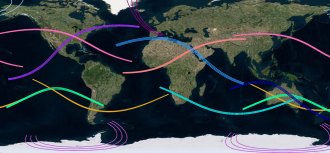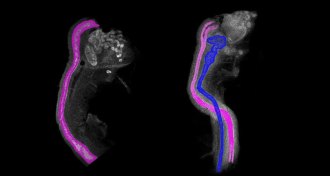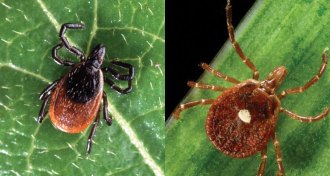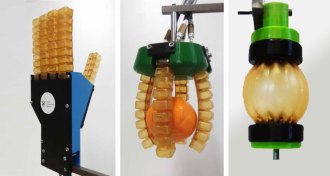Uncategorized
-
 Astronomy
AstronomyCosmic lens lets astronomers zoom in on a black hole’s burps
The beginnings of a jet from an active black hole in a distant galaxy were spotted thanks to a lucky alignment.
-
 Astronomy
AstronomyHere are the paths of the next 15 total solar eclipses
From 2017 to 2040, there will be 15 total solar eclipses. Here's a map of where to see them.
-
 Astronomy
AstronomyWe share the Milky Way with 100 million black holes
New census calculates black hole populations in galaxies big and small.
-
 Astronomy
AstronomyWhere does the solar wind come from? The eclipse may offer answers
A quick-fire polarization camera should help scientists detect the origins of the solar wind during the Aug. 21 eclipse.
-
 Life
LifeEmbryos kill off male tissue to become female
Female embryos actively dismantle male reproductive tissue, a textbook-challenging study suggests.
-
 Neuroscience
NeuroscienceHow an itch hitches a ride to the brain
Scientists have figured out how your brain registers the sensation of itch.
-
 Astronomy
AstronomyWhy are the loops in the sun’s atmosphere so neat and tidy?
Observations during the total solar eclipse may explain why the sun’s atmosphere is so organized despite arising from a tangled magnetic field.
-
 Health & Medicine
Health & MedicineA new tool could one day improve Lyme disease diagnosis
There soon could be a way to differentiate between Lyme disease and a similar tick-associated illness.
-

-
 Astronomy
AstronomyWhat can the eclipse tell us about the corona’s magnetic field?
The corona’s plasma jumps and dances thanks to the magnetic field, but scientists have never measured the field directly.
-
 Earth
EarthSeismologists get to the bottom of how deep Earth’s continents go
Scientists may have finally pinpointed the bottoms of the continents.
-
 Astronomy
AstronomyCan the eclipse tell us if Einstein was right about general relativity?
During the eclipse, astronomers will reproduce the 1919 experiment that confirmed Einstein’s general theory of relativity.